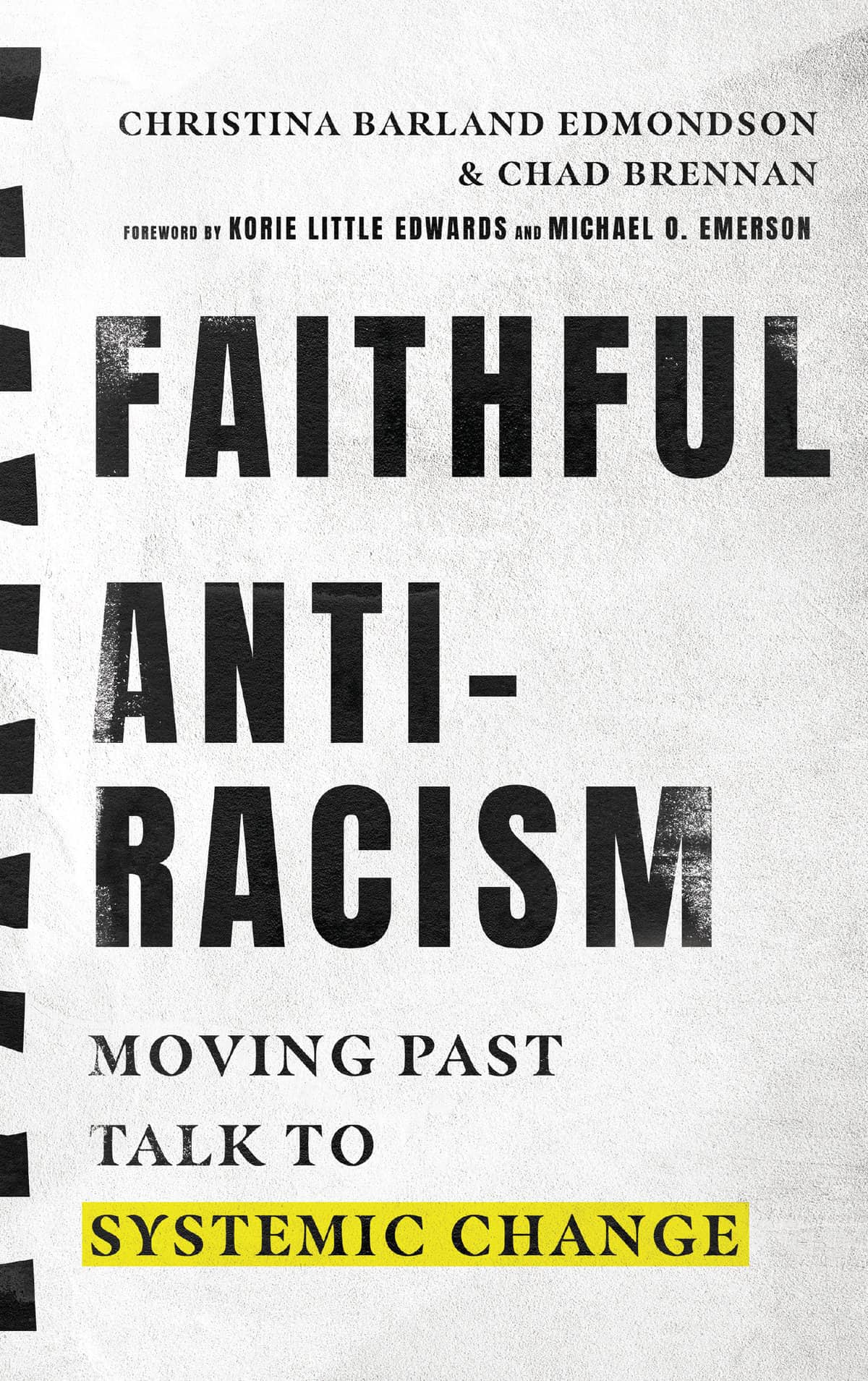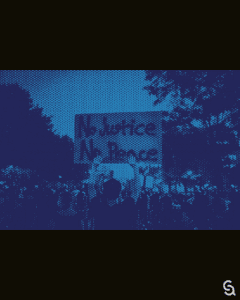
 This month, we are introducing you to some incredible Black authors and thinkers who are helping us find a pathway to sustainable peace-building, ongoing reconciliation, and honest reflection. Today we talk with Christina Barland Edmondson, a higher education instructor and organizational consultant and cohost of the Truth’s Table podcast, and Chad Brennan, coordinator of the Race, Religion, and Justice Project, and founder of Renew Partnerships, a Christian research and consulting ministry that focuses on diversity and race in faith-based organizations. Christina and Chad are co-authors of the forthcoming Faithful Anti-racism:Moving Past Talk to Systemic Change, published by InterVarsity Press.
This month, we are introducing you to some incredible Black authors and thinkers who are helping us find a pathway to sustainable peace-building, ongoing reconciliation, and honest reflection. Today we talk with Christina Barland Edmondson, a higher education instructor and organizational consultant and cohost of the Truth’s Table podcast, and Chad Brennan, coordinator of the Race, Religion, and Justice Project, and founder of Renew Partnerships, a Christian research and consulting ministry that focuses on diversity and race in faith-based organizations. Christina and Chad are co-authors of the forthcoming Faithful Anti-racism:Moving Past Talk to Systemic Change, published by InterVarsity Press.
How have each of your own personal histories led you to this moment of wanting to write a book on faithful anti-racism?
Chad: I grew up in a predominantly White suburban neighborhood in Ohio. Until I was in my 20s, my views on racial dynamics in the U.S. were a combination of indifference, cynicism, colorblindness, and offense-avoidance. The Lord used many gracious and patient friends, Scripture, books, and experiences serving with a campus ministry in the Middle East, New York City, and Columbus to shift my views. Eventually, I began to see that working toward racial justice and unity was an important part of following the teachings and example of Christ.
In 2005, my wife and I felt led to leave the campus ministry and start Renew Partnerships. Since that time, our team has enjoyed providing training, research, and coaching for many Christians and Christian organizations. From 2018-2020, I directed a major national study of racial dynamics in U.S. Christianity in partnership with the Barna Group, lead researchers Drs. Glenn Bracey and Michael Emerson, and hundreds of experts. Around that time, I began to consider sharing about my journey and our research and experiences in a book.
Christina: I was raised in the church, specifically the historic Black church in America. There, we would have never used much of the jargon or buzzwords like evangelical, but we certainly checked the boxes on Bible centrality, evangelism, and faith informing all of our lives. I had very little interaction with white Christians growing up in Baltimore and probably attended one service at a predominately White church my entire childhood.
Despite my parents’ nurturing and protective ways, I wasn’t shielded from racism. There was no way to avoid it. I studied the social sciences in college and graduate school, along the way narrowing my focus from society to the individual. My faith has always been in conversation with what I was seeing in theory and data. Thinking about how religion, and specifically Christianity, shape identity and connection to other people is both fascinating and important to my work.
Some time in my 30s, I started to engage more intentionally with White American Christians as fellow Christians in worship settings. It was in those spaces that I sometimes felt more like an anthropologist or specimen than a fellow worshipper, as I tried to reconcile the ways different Scriptures were either avoided or interpreted to leave the attendees unblessed by the calling to dismantle racial bigotry in life, in practice, and in politics.
My work in higher education, over time, included teaching and administrating at a predominately White Christian college. This space put me into contact with a host of researchers and ministers. Also, it offered intellectual resources, opened curiosity and probing questions to grapple with the ways that segments of the American church perpetuate and fuel racial division in the States and globally.
In the book, you have a guiding prayer for peace. Why is peace what we must long for in these days?
Christina: In Christ, we have the Prince of Peace, incarnate. This type of peace is best described not by a feeling but rather by shalom. Shalom can be thought of as wholeness and justice. Racism attempts to weave back the walls of hostility Christ has torn down. Racism is a blatant affront to the work of the Cross. I imagine many people, even those often finding their identities in a cultural warring, are ready to lay down their tools of warfare. It is exhausting.
Within the States, the political machines have perfected enemy-making as a power partisan strategy. We find ourselves in a plot-twisting pandemic and seemingly never-ending grueling political seasons. We need peace, real rest from warring and division.
In the book you touch upon some of the latest research in the area of racial healing and equity. What was the most surprising–good or bad–statistic for you as you have done the hard work of trying to move forward in faithful anti-racism?
Chad: One of the most surprising statistics for me has been seeing that White, Hispanic/Latino, and Asian Christians are typically much less motivated to work toward racial justice than non-Christians. For many reasons (we share some of them in the book), there is a disconnect for many Christians between motivation to address racial injustice in our society and verses like these:
- Speak up for those who cannot speak for themselves, for the rights of all who are destitute. Speak up and judge fairly; defend the rights of the poor and needy (Prov. 31:8-9).
- Learn to do right; seek justice. Defend the oppressed. Take up the cause of the fatherless; plead the case of the widow (Isa. 1:17).
I guess I shouldn’t have been too surprised to see the disconnect. That used to be my story, as well. We hope the book will help Christians to grow in their motivation and ability to take practical action steps to apply the Bible’s teachings on justice in our society today. I’m thankful Christians for Social Action is doing that important work as well!
Why is the work of anti-racism the church’s to do?
Christina: The work of anti-racism, resisting the principality of racism, is for the church to do for a few reasons. I will highlight two.
The first reason is because racism cannot persist apart from the moral endorsement, complicity, or silence that segments of the visible church provide. As we survey history and present research, we cannot disentangle racism from the White Christian church in America. That statement is full of lament but only surprising by means of strategic avoidance of the truth. This does not mean that every White Christian or tradition holds the same level of complicity; however, I would make the case that most White Christians have been given a host of reasons, even propaganda, to not even ask themselves or their traditions probing questions about racism.
Research shows how some version of Christianity is often functioning to cement entitled racism, even if called by another name. All of this to say, the church bears the burden to attempt to fix what it perpetuates.
The second reason for the church to do the work of anti-racism is that the church has unique resources found within the gospel that makes it equipped and called to sacrifice for the good of the world. Through sanctification, Christians are being made more like Jesus. To be made more like the Jesus of the Bible most certainly includes becoming more compassionate, just, truthful, and sacrificial for the sake of love.
We, the invisible church, are a multi-ethnic global family making up the body of Christ here on earth. If we are truly believers of Jesus of Nazareth, we are a part of the solution and have been given the calling of peacemaking reconciliation.
 Adaptation from Faithful Anti-racism by Chad Brennan and Christina Edmondson
Adaptation from Faithful Anti-racism by Chad Brennan and Christina Edmondson
The Art of Being a Faithful Anti-racist (Christina)
A few years ago, after the mass shooting at Mother Emanuel AME Church in Charleston, South Carolina, I taught a group of grief-stricken and frustrated churchgoers and clergy. During the teaching, to the side of the stage, was a local artist hired to paint in real time an image of the speakers and the heart of their message. Throughout my talk, she created a beautiful painting. There were times, as the image was being developed, it only looked like flashes of color with no rhyme or reason. However, by the end of my teaching it became clear the artist had a plan and skills to accomplish it. As I exited the stage, there it was. A large painting with my likeness and an image of growth and restoration. The artist’s observations, skill, patience, and time-management were on full display. The artist demonstrated wisdom and skill so apparent that it felt like magic. How did she pull this off?
It is fascinating to watch a skilled artist at work. A carpenter building a chair. A fashion designer shaping a dress. A chef meticulously crafting a meal. Step by step, they apply their knowledge, skill, experience, and creativity. Eventually, something functional, stunning, or delicious appears. To those like myself, without such skills, the creation is even more intriguing and beautiful.
Being a faithful anti-racist is an art, not a formulaic process. Like painting a picture, building a chair, shaping a dress, or crafting a meal, it requires knowledge, skill, experience, and creativity. Most importantly, it requires the leading of the Holy Spirit. No amount of knowledge or experience can prepare us for every question and situation that will come up. We need a master artist who can guide our hands and help us to create something beautiful.
The Bible’s teachings on wisdom
The Bible’s description of wisdom includes much more than simply knowing facts. It is a combination of humility, creativity, skill, expertise, and competence. For example, in Exodus we see that God gave Bezalel “wisdom” as a master artist so that he could help decorate the tabernacle: “And [God] has filled [Bezalel] with the Spirit of God, with wisdom, with understanding, with knowledge and with all kinds of skills” (Exod. 35:31).
The same Hebrew word that is translated “wisdom” (chokmah) in Exodus 35:31 is also used in Psalm 107:27 as a description for sailors who are unable to navigate through a challenging storm. In the NIV, the verse is translated, “they were at their wits’ end.” More literally, “they were at their wisdom’s end.” In other words, their experience, skill, and ingenuity were not enough to save them from an overwhelming circumstance. For a helpful visual overview of the Bible’s teachings on wisdom, we recommend the five-minute video “The Book of Proverbs” by The Bible Project.
The Bible calls us to live with wisdom—effectively applying our knowledge and skills to everyday life in ways that align with God’s will and that benefit our own lives, our neighbors, and society. This is true in all areas of our lives, including our approach to racial dynamics. Wisdom isn’t something we muster up in our own strength or by academic study alone. Wisdom is given as a gift and even more specifically as an answer to prayer. As James explains, “If any of you lacks wisdom, you should ask God, who gives generously to all without finding fault, and it will be given to you” (James 1:5).
The Bible also emphasizes we must have a healthy “fear” of God in order to grow in wisdom. As Solomon explains, “The fear of the Lord is the beginning of wisdom, and knowledge of the Holy One is understanding” (Prov. 9:10). Fear in this sense refers to honoring and submitting to God’s will and taking on a posture of humility and teachability. It is acknowledging that God is the source of all wisdom, not ourselves.
We hope and pray you grow in your wisdom in regard to racial dynamics—that is, your ability to apply your creativity, skills, and knowledge to the complexities of racial dynamics. That requires more than just learning facts and principles. It requires you to ask God for wisdom in a posture of humility and teachability. It also requires you to reflect on the unique mix of experiences and abilities God has given you. How have you been uniquely equipped to be a faithful anti-racist?
A Difficult Reality to Accept (Chad)
Research data shows that Christians in some racial groups generally have less accurate racial views than non-Christians within their racial group. When I first began to study racial dynamics in the United States, that was a difficult reality for me to accept. I have been a Christian for as long as I can remember, and I have been surrounded by loving, committed Christians throughout my life. I grew up viewing Christians as people who stand for what is right, love their neighbors, turn the other cheek, and walk the extra mile. But the more I learned about the relationship between Christianity and racial injustice in our country, the more I was disturbed by what I saw.
Studying racial dynamics in U.S. Christianity can challenge our view of our Christian heritage, our respected mentors, our organizations, and ourselves. In the past, I have wanted to dismiss the realities we share in this book as inaccurate, exaggerated, politically motivated, or unfair. If you feel that way, I encourage you to take the time to explore with an open mind the data and historical examples we share, and I believe you will discover what I discovered. There is a tremendous amount of evidence that the views and actions of many Christians, both in the past and present, are very far from what Christ taught and modeled.
Oftentimes, I have wanted to close my eyes and wish it all away or go back to the days when I wasn’t able to see what I can see now, but I am thankful that is not possible. I now realize that my desire to “unsee” racial injustice is an expression of my privilege. As Christians we do not need to be afraid of the truth, even when it hurts. As Jesus said, “If you hold to my teaching, you are really my disciples. Then you will know the truth, and the truth will set you free” (John 8:31-32). The truth gives us freedom. Lies, denial, and willful ignorance keep us trapped in bondage.
James Baldwin famously said, “I love America . . . and, exactly for this reason, I insist on the right to criticize her perpetually.” Similarly, it is our love for the church that compels us to point out the weaknesses that keep it from being the source of light, hope, truth, and love that God desires for it to be. Our criticism is an act of love. We point out these areas of concern for the benefit of the church, individual Christians, and our society.
Adapted from Chapter 1, “Faithful Anti-racists Have Wisdom,” of Faithful Anti-racism by Chad Brennan and Christina Edmondson. Copyright 2022 by Chad Brennan and Christina Edmondson. Published by InterVarsity Press, Downers Grove, IL.


